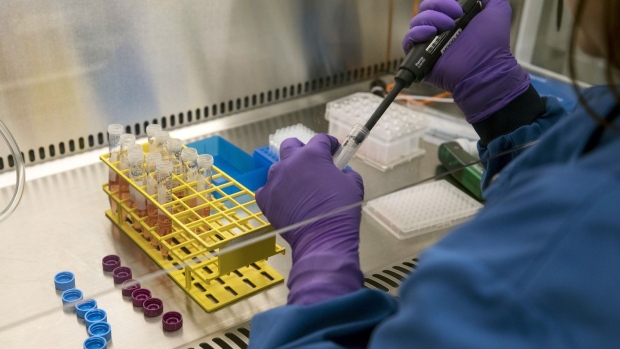Oct 28, 2020
Glaxo profit beats estimates as vaccination rates recover
, Bloomberg News

GlaxoSmithKline Plc, the British pharmaceutical giant, reported quarterly earnings that beat analysts’ estimates, overcoming concerns the pandemic would hamper demand for its vaccines.
Demand for preventive shots returned at the end of the third quarter after dropping off earlier in the year, the drugmaker said Wednesday, helping to protect Glaxo’s 2020 forecast. Quarterly earnings of 36 pence a share beat analysts’ average estimate of 30 pence, while sales of 8.6 billion pounds (US$11.1 billion) fell short of expectations.
Routine vaccinations declined globally in the first half of 2020 as the COVID-19 pandemic and lockdown measures discouraged visits to doctors. Glaxo, the world’s biggest vaccine maker with more than 30 shots in its portfolio, said it saw U.S. demand rebound for its key shingles preventive, Shingrix, at the end of the quarter. Sales of the shot are up 6% this year.
“We are back at pre-pandemic levels” for Shingrix demand, Chief Executive Officer Emma Walmsley said on a call with reporters.
Glaxo also makes vaccine boosters called adjuvants and is using the technology to develop a COVID shot with Sanofi that began human trials in September. The companies are planning to start late-stage tests before year-end with the aim of submitting the product for approval in the first half of 2021.
Walmsley said the company was also planning to have trial data from two other Covid-19 vaccine partnerships with Chinese biotechnology company Sichuan Clover Biopharmaceuticals Inc. and Canada’s Medicago Inc. by year-end.
Antibody Therapy
The pharma giant is working with Vir Biotechnology Inc. on possible therapeutics for the coronavirus, including antibody treatments like the one from Regeneron Pharmaceuticals Inc. that U.S. President Donald Trump received. Walmsley said the company hadn’t yet decided how to price such therapies, if they’re successful.
“We’re still very much in the process of development,” said Walmsley. “There will clearly be unprecedented patient need here, and we should just rest assured that GSK has a very good, strong record for being responsible on pricing.”
The U.S. government agreed to pay Eli Lilly & Co. US$375 million for 300,000 vials of its experimental COVID-19 antibody this week, if the treatment is approved. That comes to about US$1,250 per 700-milligram dose. U.S. patients won’t pay out-of-pocket costs to get the medicine, the government said.
AstraZeneca Plc has said it anticipates providing its potential antibody treatments at “commercial terms.” Glaxo and Astra have both said they won’t profit from COVID-19 vaccines, should they succeed, during the pandemic.
Glaxo’s shares fell 3.7 per cent at 3 p.m. in London. They dropped about 24 per cent so far this year before Wednesday.